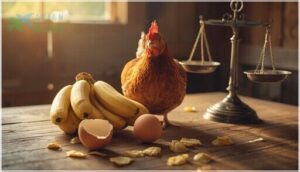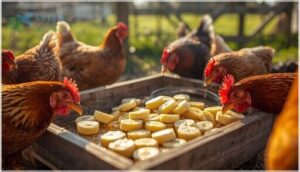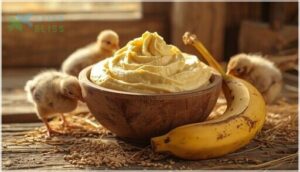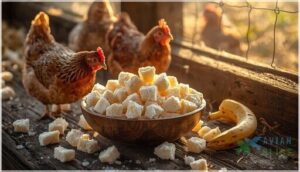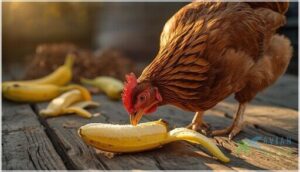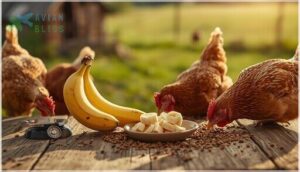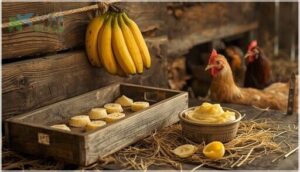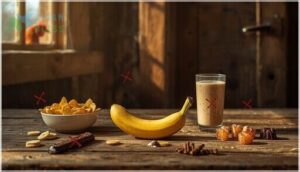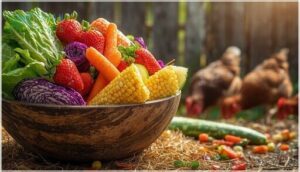This site is supported by our readers. We may earn a commission, at no cost to you, if you purchase through links.

You toss a bruised banana toward the coop, and before it hits the ground, your flock descends like feathered velociraptors. Bananas are safe for chickens and actually pack some impressive nutritional benefits—potassium for stronger eggshells, vitamins for immune support, and natural sugars for quick energy.
But here’s the catch: that same sugar content that makes bananas so appealing can create problems if you’re too generous with portions. The difference between a healthy treat and a dietary disaster comes down to how much you offer and how you prepare it. Getting the balance right means understanding what bananas bring to the table and where they fit in your flock’s overall nutrition plan.
Table Of Contents
- Key Takeaways
- Can Chickens Eat Bananas Safely?
- Nutritional Benefits of Bananas for Chickens
- Risks of Feeding Bananas to Chickens
- How to Prepare Bananas for Chickens
- Can Chickens Eat Banana Peels?
- How Much Banana Should Chickens Eat?
- Best Ways to Serve Bananas to Chickens
- Foods to Avoid When Feeding Bananas
- Alternatives to Bananas for Chickens
- Frequently Asked Questions (FAQs)
- Are bananas poisonous for chickens?
- Can you feed bananas to chickens?
- Do chickens eat vegestables?
- Can chickens eat bananas and the peels?
- How much banana can I give my chickens?
- What shouldn’t you feed to chickens?
- What is a chicken’s favorite fruit?
- Can chickens eat really ripe bananas?
- Are there any fruits that chickens can’t eat?
- How to prepare bananas for chickens?
- Conclusion
Key Takeaways
- Chickens can safely eat bananas in moderation, but treats should stay under 10% of their daily diet—aim for 1-2 small slices per bird, once or twice weekly, to avoid digestive upset from high sugar content.
- Bananas deliver potassium that strengthens eggshells and supports smooth egg laying by helping calcium metabolism and oviduct muscle function, plus vitamins and antioxidants that boost immune health.
- You can serve bananas fresh, mashed for chicks, or frozen for summer relief, and chickens can eat the peels too if you wash them thoroughly and chop them small to prevent choking.
- Watch for watery droppings, weight gain, or reduced egg production as signs of overfeeding, and always keep bananas as an occasional snack rather than a dietary staple alongside quality chicken feed.
Can Chickens Eat Bananas Safely?
Yes, chickens can eat bananas safely when you offer them in moderation. Most poultry experts agree that bananas aren’t toxic to your flock, making them a popular choice for treats. You’ll want to watch your birds the first time you introduce bananas to guarantee no adverse reactions occur.
Start small and observe their response—healthy chicken health monitoring means paying attention to how your flock copes with new fruit intake. While banana allergy risks are extremely rare in poultry, digestive upset can happen if you overdo it. Think of bananas as an occasional snack rather than a dietary staple. For chicks, introduce bananas carefully in smaller portions than you’d give adult birds.
Smart flock nutrition management and poultry diet diversity mean balancing treats for chickens with their regular feed, ensuring banana peels and whole fruit support rather than replace proper nutrition. Ensuring the scientific study of chicken nutrition involves careful consideration of methodological rigor to provide accurate information.
Nutritional Benefits of Bananas for Chickens
Bananas aren’t just a sweet snack for your flock—they’re actually packed with nutrients that support your chickens’ health. From vitamins that boost their nervous system to minerals that keep their bodies running smoothly, this yellow fruit brings real benefits to the coop.
Let’s look at what makes bananas a nutritious addition to your chickens’ diet.
Key Vitamins and Minerals
Bananas offer a simple vitamin balance your flock can enjoy. A medium banana packs around 400–450 mg of potassium, plus small amounts of vitamin B6, vitamin C, magnesium, and antioxidants that support nutrient absorption and general health.
While they won’t replace feed fortification or mineral supplements, they do add variety and help meet dietary needs when you’re rotating treats.
Potassium and Egg Laying
That potassium boost plays a bigger role than you might expect. It helps maintain acid-base balance in your layers, aids calcium metabolism during shell formation, and keeps the oviduct muscles working smoothly so eggs pass efficiently. When potassium levels stay balanced alongside calcium and magnesium, you’ll see stronger shells and steadier laying performance across your flock.
Potassium keeps your layers’ shells strong and egg production steady by balancing minerals and supporting smooth oviduct function
Here’s how potassium aids laying hens:
- Influences eggshell quality by aiding calcium metabolism in the shell gland
- Maintains acid-base balance that affects overall egg production
- Aids smooth muscle function in the oviduct for efficient egg passage
- Works with magnesium and calcium to maintain proper mineral balance
- Correlates with daily egg output when dietary ratios meet flock nutrition needs
Antioxidants and Health Support
Beyond mineral balance, those bananas bring vitamin C, vitamin E, and carotenoids that help your flock fight oxidative stress. The polyphenols and flavonoids offer free radical protection that aids immune system boost and healthy aging strategies.
While the antioxidant contribution is modest compared to dedicated dietary supplements, bananas still add variety to your avian health routine, complementing selenium and vitamin E for better litter health and egg quality.
Risks of Feeding Bananas to Chickens
Bananas are packed with good stuff, but too much of a good thing can stir up trouble in your flock. Like any treat, bananas come with a few cautions you’ll want to keep in mind.
Let’s look at the main risks so you can keep your chickens healthy and happy.
High Sugar Content
Like candy for kids, too much sweetness can backfire. Bananas pack natural sugars that add up quickly in your flock’s diet. Here’s what you need to watch:
- Ripe Bananas contain fructose, glucose, and sucrose that can spike caloric intake
- Sugar Intake should stay balanced with their regular feed for proper Chicken Nutrition and Health
- Banana Peels also carry concentrated sugars requiring careful Caloric Management
- Fruit Alternatives help maintain Nutrient Balance across weekly treats
- Dietary Restrictions matter—limiting Fruit and Vegetable Intake prevents metabolic issues
When Chickens Eat Bananas, moderation protects their health.
Digestive Issues and Overfeeding
Overindulgence brings trouble fast. When you pile on too much banana, your birds’ systems can’t keep up—Digestive Enzymes struggle with the sugar load, throwing off Gut Balance and Nutrient Absorption.
You’ll spot loose droppings or sluggish behavior as their Crop Health falters.
Smart Feed Management means watching portion sizes closely, protecting Flock Health through thoughtful Feeding Strategies that support steady Chicken Nutrition without overwhelming their digestive issues.
Signs of Banana Overconsumption
Watch for watery droppings that linger—your first red flag that Digestive Issues are brewing. You’ll notice Weight Gain creeping in, along with dull feathers and reduced egg laying.
When Chickens Eat Bananas too often, these Overfeeding Symptoms point to Nutrient Imbalance and real Health Risks. Monitor Chicken Health and Nutrition closely, cutting back treats before problems worsen.
Recognizing chicken health issues is essential for maintaining a healthy flock.
How to Prepare Bananas for Chickens
Getting bananas ready for your flock doesn’t have to be complicated. You can serve them in a few different ways depending on what works best for your chickens and the weather.
Here are the simplest methods to turn this yellow fruit into a healthy treat your birds will love.
Fresh Banana Slices
Fresh banana slices make an ideal chicken treat when you’re looking for healthy snack ideas your backyard chickens will love. When chickens eat bananas, they enjoy fresh fruit benefits without complicated preparation—just slice and serve.
- Cut bananas into small, bite-sized pieces to prevent choking
- Offer slices after their regular chicken feed to avoid selective eating
- Wash thoroughly to minimize banana allergy risks from pesticide residue
- Keep portions modest as part of balanced banana slice preparation
Always provide fresh water alongside any fruit treats.
Mashed Banana for Chicks
Mashed treats can support chick development when you’re raising healthy chicks from day one. Blend fully ripe bananas—never unripe bananas—into a smooth paste to avoid choking.
Backyard chickens of all ages enjoy this texture, but it’s especially helpful for young birds shifting to solid chicken feed.
Start with a pea-sized portion once weekly, watching for any banana allergy signs. This approach complements chick nutrition without replacing their balanced starter diet.
Frozen Banana Treats
When summer heat hits your coop, frozen banana chunks offer cool relief your flock will love. Peel and slice bananas, freeze them in single layers, then offer small portions as chicken treats—not daily dietary supplements.
Smart frozen fruit benefits:
- Encourages foraging behavior and pecking exploration
- Provides potassium and vitamin B6 for chicken nutrition
- Keeps treat portioning simple at 5–10% of daily intake
This banana enrichment ensures frozen treat safety while respecting your chicken diet’s foundation.
Can Chickens Eat Banana Peels?
You don’t have to toss those banana peels in the compost. Chickens can actually eat them, though you’ll want to know a few things before you offer them to your flock.
Let’s look at what peels bring to the table, how to prepare them safely, and what risks you should keep in mind.
Nutritional Value of Peels
Banana peels bring more to the table than you might think. While they’re not a replacement for quality chicken feed, these often-discarded scraps contain fiber that aids gut health and minerals like potassium and magnesium that complement your flock’s dietary needs. The peel’s moisture content adds hydration value, and trace antioxidants may help with oxidative stress in your birds.
| Nutrient Component | Poultry Nutrition Benefit | Feeding Note |
|---|---|---|
| Fiber | Aids digestive health | Feed in moderation |
| Potassium & Magnesium | Maintains fluid balance | Lower than fruit flesh |
| Antioxidants (Polyphenols) | Reduces oxidative stress | Mild protective effects |
Preparation and Safety Tips
Knowing peels are nutritious is one thing—handling them safely is another. Wash banana peels thoroughly under running water to remove pesticides and chemical residues that could impact poultry safety.
Cut the peel into small, manageable pieces for easier digestion and to prevent choking hazards. Proper fruit preparation and food handling reduce fruit toxicity risks while supporting chicken nutrition.
Store any unused portions in clean, covered containers to maintain freshness in your feeding strategies for chickens.
Potential Risks of Peels
While banana peels offer nutrients, they also carry peel toxicity concerns—pesticide exposure and tough fiber can trigger digestive issues in your flock. High tannin content may upset gut health, especially with excessive fiber intake.
These fruit toxicity risks make moderation essential for animal health and wellness. When you’re planning dietary needs and supplements through fruit and vegetable feeding for chickens, always prioritize manageable portions to protect their well-being.
How Much Banana Should Chickens Eat?
Knowing that bananas are safe is one thing, but figuring out the right amount is where many chicken keepers stumble. Too much of a good thing can upset your flock’s nutritional balance and lead to problems you’d rather avoid.
Let’s break down the portion sizes, feeding frequency, and signs to watch for in your birds.
Portion Guidelines
Think of bananas as the dessert in your flock’s meal plan, not the main course. When you’re setting up Serving Sizes, aim for just 1-2 small slices per bird at each feeding. This keeps fruit treats under 10% of Daily Intake while protecting Nutrient Balance.
Your chicken feed should always make up the bulk of their chicken diet, with bananas as an occasional boost. Monitor Feed Ratios carefully, and adjust Dietary Limits based on what you observe during flock management.
Frequency of Feeding
You’ll want to set Feeding Schedules that offer bananas just once or twice per week to keep your chicken diet balanced. Most poultry experts recommend this Meal Frequency to avoid gut upset in your flock.
When feeding chickens fruit treats, stick to 1-2 small pieces per day for every 4-6 birds. This protects Nutrient Balance while letting your Daily Rations stay focused on quality chicken feed.
Monitoring Your Flock’s Health
Vigilance matters when you’re adding treats to your birds’ daily routine. Schedule regular Health Checks to watch for digestive issues like runny droppings or sluggish behavior—early signs your Flock Management needs tweaking.
Strong Nutrition Planning protects avian health, so keep Disease Prevention top of mind. If chicken health concerns pop up, reach out for Veterinary Care and adjust your flock’s avian nutrition plan accordingly.
Best Ways to Serve Bananas to Chickens
Once you’ve figured out the right amount, it’s time to think about how you serve those bananas. The method you choose can make a big difference in keeping things clean and giving your chickens something fun to do.
Here are a few tried-and-true ways to offer bananas to your flock.
Hanging Bananas for Foraging
You can hang bananas from a string or perch to spark foraging behavior and get your backyard chickens moving naturally. This enrichment activity triggers their instinct for natural pecking while adding fruit variety to their routine.
When your flock explores and pecks at the hanging treat, it provides flock stimulation that keeps chicken behavior healthy and engaged without much effort from you.
Mixing Bananas With Feed
Chopping bananas into small, even pieces lets you blend them right into your flock’s regular feed without disrupting their nutrient balance.
Here are some feed mixing tips for supplement safety:
- Keep banana ratios low—just a small percentage of total daily intake
- Cut pieces uniformly so chickens don’t pick through their meal
- Mix thoroughly to guarantee even distribution across the flock
- Monitor flock nutrition to avoid imbalances from excessive fruit additions
This method maintains their staple rations while adding variety.
Using Bananas as Enrichment
Turning bananas into foraging puzzles sparks curiosity and keeps your backyard flock busy. Hanging whole bananas or skewering slices onto enrichment devices engages natural pecking instincts and offers sensory stimulation through texture and aroma. Short 10–15 minute sessions encourage social interaction without displacing core nutrition, and rotating these chicken treats weekly sustains flock engagement while preventing boredom-driven behaviors.
| Enrichment Method | Benefit |
|---|---|
| Hanging whole bananas | Encourages foraging behavior and physical activity |
| Skewered banana slices | Provides varied textures for pecking exploration |
| Timed 10–15 min sessions | Maintains novelty without overfeeding your flock |
| Rotating weekly stations | Sustains interest and promotes social interaction |
Foods to Avoid When Feeding Bananas
While bananas make a healthy treat for your flock, not all banana-related foods are safe for chickens. Some combinations and processed products can actually harm your birds’ health or upset their digestive systems.
Let’s look at what you should keep out of your chickens’ diet when offering bananas.
Banana Chips and Processed Products
Banana chips might seem like a handy shortcut, but they’re not a good fit for your flock. Here’s why processed food risks outweigh convenience:
- Sugar content in commercial banana chips can spike blood sugar and lead to weight gain
- Oil effects from frying add unnecessary fat your chickens don’t need
- Preservative dangers include additives that may upset digestion
- Fresh banana chip alternatives, like sliced raw bananas, support better chicken diet and digestion
Stick with whole fruit and vegetable treats for chickens instead.
Combining Bananas With Other Treats
You can pair bananas with other safe kitchen scraps like berries or melon for treat variety, but watch what you mix. High-salt snacks or processed foods throw off nutrient balance. Keep banana portions small when feed mixing to support a balanced diet. Introduce new combinations slowly and monitor digestion. Use fruit and vegetable treats for chickens as enrichment strategies, not daily staples.
| Safe to Combine | Avoid Mixing With |
|---|---|
| Berries, melon | Salty chips, crackers |
| Leafy greens | Sugary cereals |
| Chopped vegetables | Processed snacks |
Spoiled or Moldy Bananas
While pairing treats sounds helpful, spoiled or moldy bananas cross a safety line your flock shouldn’t face. Mold produces fungal toxins that irritate digestion and may slow growth, while rotten banana effects include diarrhea and pest attraction that compromise coop sanitation. Check your bananas before sharing—visible fuzzy or dark mold means toss it. Fresh fruit promotes nutrition and chicken care, but spoilage turns generosity into risk.
- Discard bananas showing fuzzy, green, or dark mold growth
- Spoilage bacteria attract pests and create coop odors
- Nutrient losses make old fruit less beneficial to your flock
Alternatives to Bananas for Chickens
Your chickens don’t need to rely on bananas alone for treats and variety in their diet.
There’s a whole garden of safe fruits and vegetables that can keep your flock happy and healthy.
Let’s look at some nutritious alternatives that you can rotate into your feeding routine.
Other Safe Fruits and Vegetables
Your flock will thrive on variety beyond just bananas. Apples (minus seeds) deliver Apple Benefits through their fiber and vitamin C. Pears offer Pear Nutrition with gentle digestive support. Berry Options like strawberries and blueberries pack antioxidants into tiny bites. For Melon Hydration on scorching days, try watermelon or cantaloupe. Cucumbers provide Cucumber Health with low-calorie crunch that chickens love.
| Fruit/Vegetable | Key Benefit | Serving Tip |
|---|---|---|
| Apples (no seeds) | Fiber & Vitamin C | Small chunks only |
| Berries | Antioxidant boost | Whole or halved |
| Melons | Hydration support | Fresh, seeded pieces |
| Cucumbers | Low-calorie crunch | Sliced or whole |
These Chicken Treats and Snacks support Food and Nutrition for Chickens while promoting Sustainable Farming Practices. Feeding Chickens Fruits and Vegetables means offering fruit for chickens in thoughtful rotation.
Rotating Treats for Balanced Nutrition
Offering treats in rotation keeps your flock’s Nutrient Balance steady over time. Dietary Planning matters—limit non-grain treats to a small fraction of daily intake and swap fruit choices every few days.
Feed Variety prevents nutrient gaps, while Flock Monitoring through egg production and weight checks confirms your treat rotation works. Food Variety promotes long-term health better than repeating favorites.
Frequently Asked Questions (FAQs)
Are bananas poisonous for chickens?
Bananas aren’t poisonous to chickens when you feed them in moderation. The fruit contains no toxic compounds that harm your flock, though banana peels may carry pesticide risks if unwashed.
Can you feed bananas to chickens?
Yes, you can feed bananas to your backyard flock as an occasional treat. They’re safe, nutritious, and provide variety in your chickens’ diet when offered in moderation alongside balanced chicken feed.
Do chickens eat vegestables?
Your backyard flock thrives on fresh produce like leafy greens, carrots, and cucumbers. Vegetable variety aids chicken digestion and nutrient balance when you complement quality poultry nutrition with these wholesome additions to their chicken feed.
Can chickens eat bananas and the peels?
Ever wondered if those leftover peels are safe for your flock? Chickens can enjoy bananas and peels in moderation—just wash thoroughly to remove pesticides and chop peels small for easier digestion and peel safety.
How much banana can I give my chickens?
Keep treats, including bananas, under 10% of your chickens’ daily diet. A good banana serving size is 2 to 4 inches per bird, offered once or twice weekly to maintain nutrient balance.
What shouldn’t you feed to chickens?
Avoid toxic foods like avocado, chocolate, and caffeinated items. Skip raw meat, moldy grains, and spoiled dairy, as these harm your flock.
Processed snacks with high salt cause serious health problems in chickens.
What is a chicken’s favorite fruit?
While no single fruit tops every chicken’s list, your flock will likely flock to bananas, berries, and apples.
Watch your birds—pecking order and personality shape which treats spark the most excitement.
Can chickens eat really ripe bananas?
Yes, your chickens can enjoy really ripe bananas as healthy snack options. The soft texture improves banana digestion, though higher sugar means moderation matters.
Watch for loose droppings—a sign you’ve exceeded chicken treat guidelines.
Are there any fruits that chickens can’t eat?
While most fruits are safe, avocado poses serious toxicity risks for chickens due to persin. Citrus fruits can irritate their digestive systems, and fruit seeds may contain harmful compounds, so remove them before offering treats.
How to prepare bananas for chickens?
Banana ripening matters—offer ripe, room-temperature fruit sliced into bite-sized pieces. Wash thoroughly, remove peels for easier eating, and serve alongside chicken feed.
Freeze extras for hot-weather treats, keeping kitchen scraps fresh and safe.
Conclusion
Everything in moderation—that old wisdom holds especially true when you’re deciding whether chickens can eat bananas. A few slices offer vitamins, potassium, and happy clucking, while too much brings digestive trouble and nutritional imbalance.
Treat bananas as the occasional snack they should be, not a dietary staple. Watch your flock’s response, adjust portions accordingly, and remember that variety keeps your chickens healthiest.
Your birds will thank you with strong shells, vibrant feathers, and steady egg production.
- https://www.sciencedirect.com/science/article/pii/S2949916X23000464
- https://www.cdc.gov/healthy-pets/about/backyard-poultry.html
- https://poultry.extension.org/articles/feeds-and-feeding-of-poultry/basic-poultry-nutrition/
- https://edis.ifas.ufl.edu/publication/AN239
- https://ranchr.ag/blog/can-chickens-eat-cherries/


